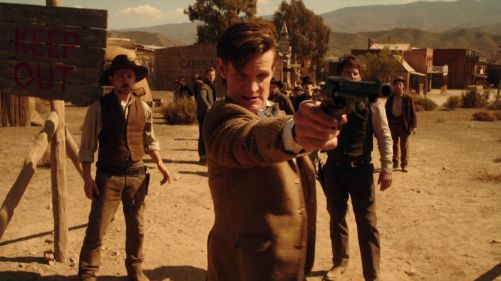
“A Town Called Mercy” is the third Doctor Who western that the British franchise has created since “The Gunfighters” in 1966, giving us an anachronistic genre clash of cowboys and aliens (and it also gives the Eleventh Doctor another opportunity to wear a pretty cool Stetson hat to blend in with the local culture, like he did in “The Impossible Astronaut” and “The Wedding Of River Song“). The plot of this episode is pretty simple and straightforward, and that’s certainly not a bad thing. The simple premise means the actual unfolding of “A Town Called Mercy” has a lot of space breathe, and I would definitely say it’s one of the better-paced episodes of Series 7.
“A Town Called Mercy” takes pretty much the same approach to crafting an episode about cowboys that “The Curse Of The Black Spot” took to pulling off an episode about pirates: embracing all the tropes and clichés that you would come to expect from an old Hollywood western, like a suspicious man with a dark past that’s come home to roost, a terrified town that’s being held hostage, an implacable, black-hatted gunslinger on the warpath, a mysterious stranger wandering into town to save everyone, the local marshal being killed and passing along his badge to the protagonist, a showdown at high noon, and perhaps even a dying moment of redemption for one of the antagonists.
I’ve always had a soft spot for westerns and western parodies that are handled well: there’s something very earnest, rustic and adventurous about the genre that’s very appealing to me, and a western setting makes for the perfect backdrop for Doctor Who to craft a morality tale. During the golden age of westerns, these sorts of movies were usually all about the rise and fall of men, whether the main characters were done in by greed, pride, envy or a desire for revenge. But they were also filled with themes about redemption and atonement – lawless men regaining some of their honor and humanity that they had previously lost as their lives came to a close – especially as westerns started to grow more complex and morally grey in the 1960’s and the 1970’s. In the western genre, characters were defined by the choices they made more than anything else – and likewise, ever since it returned to television in 2005, Doctor Who has always been a series that stresses the importance of personal accountability.
“A Town Called Mercy” is penned by Toby Whithouse, and it’s the fourth story that he’s written for Doctor Who overall since 2006 (after “School Reunion“, “The Vampires Of Venice” and “The God Complex“). Over the last seven seasons, it’s become very apparent that Toby Whithouse loves to scrutinize the Doctor’s character and call him out on his personality flaws, which makes him an ideal choice for handling episodes where the Doctor receives character development. “A Town Called Mercy” continues the main theme that all of his episodes seem to have, by examining the Doctor’s approach to handling law and justice.
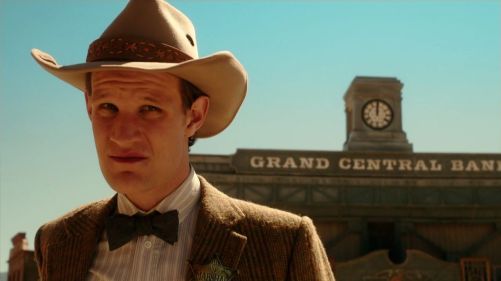
In “A Town Called Mercy”, the Eleventh Doctor and his friends discover a little town in the old west that’s currently under siege. The townspeople there are being held hostage by a robotic gunslinger from space who’s been trying to starve them all out for weeks, looking for a fugitive living among them – and naturally they’ve all grown desperate. Initially, the Doctor is in pretty high spirits, enjoying this rare opportunity to have fun with rough and rugged cowboys who live off the harsh desert land. But once he discovers the truth about Kahler-Jex, the fugitive in question, his whole demeanor grows ice cold: and that’s when “A Town Called Mercy” really gets interesting. This episode is the first time we’ve seen the Eleventh Doctor’s temper well and truly explode since the early episodes of Series 5 (like “The Beast Below” and “Victory Of The Daleks“), and I’m not gonna lie, Matt Smith’s performance when the Doctor is chewing out Jex gave me a few chills.
Once he’s fully aware of what Kahler-Jex is and why the Gunslinger wants him so badly, he’s faced with the dilemma of whether or not he should turn him over to the ruthless assassin he created. The Doctor firmly believes he should face justice and answer for what he’s done, but exactly what sort of justice should be dealt upon him is still in question. Initially, the Doctor is all in favor of throwing him to the wolves, because he gets way too personally involved in this matter, and because Jex reminds him a bit too much of himself. The time war arc that Russell T. Davies started has been put on the backburner for the last couple of seasons, so Steven Moffat could have a fresh start with his own era as showrunner without it being tied down by a lot of continuity – but Series 7 is officially bringing it back to set up “The Day Of The Doctor“, the show’s 50th anniversary special. As much as the Doctor might judge Jex for his atrocities, his own hands are not exactly clean either – he’s spent the last few centuries of his life trying to atone for his own war crimes, and many of the things he says about Jex wanting to run and hide from his past could also be said about him.
As you might have guessed from the way he previously handled Solomon or the Silence, the Eleventh Doctor has developed a taste for vigilante justice over the course of his tenure, and that sort of thing can easily lead a man down a dangerous path. In the Doctor’s own words, he’s started to grow frustrated with his pacifistic approach to sorting out injustice. He’s always tried to hold back for as long as he can and show mercy towards his enemies, and usually, the end result is that they go on to cause more damage and kill even more people (“Human Nature” is an excellent example of this). When he tries to hand Jex over to the Gunslinger, he feels righteous and justified in his decision, but Amy cuts him down to size. Donna Noble is once again proven right about how the Doctor needs someone to call him out sometimes and hold him to his principles when he threatens to cross a line, and Amy, his best friend, certainly steps up to do just that by reminding him who he is and who he strives to be.
The Doctor becomes the town’s new marshal after the previous marshal (poor Isaac) dies saving Jex’s life from the Gunslinger – something Jex, the Doctor and the Gunslinger can all be held accountable for. And once the Doctor carries that sort of weight on his shoulders, having to make decisions for dozens of people and try to set a good example for them, he takes Amy’s words of wisdom to heart and tries to honor Isaac’s memory. He does his best to save the town without any additional bloodshed, and perhaps save the souls of some of the people living in it in the process. The Doctor’s character growth from this adventure is put on full display during a tense and rather touching scene, where he talks to a scared and desperate teenager who wants to hand Jex over to the Gunslinger and gets him to walk away before he does anything he’ll regret. The Doctor has big victories (where he saves the world from hostile aliens) all the time – but it’s the more personal victories like these, where he manages to have a positive impact on one person’s life, that really resonate with the audience.
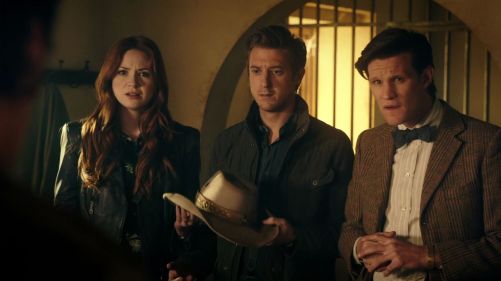
In “A Town Called Mercy”, Amy Pond (Karen Gillan) and Rory Williams (Arthur Darvill) decide to accompany the Doctor, to a Day of the Dead festival Mexico, only to get sidetracked when the TARDIS once again takes them off course to someplace where they’re needed. From there, they’re accosted by a mob of desperate people, and quickly become entangled in a dangerous conflict between a small town and an alien mence. Much like the traditional companion roles they had in “Night Terrors“, Amy and Rory don’t really have a lot to do this week, since “A Town Called Mercy” is a Doctor-centric episode. The Ponds primarily help the Doctor pull off his plans to deal with the Gunslinger: Rory heads off a dangerous mission with Marshal Issac to distract the Gunslinger, where the two trade some nice banter with each other, while Amy spends some time bonding Kahler-Jex, until he pulls a gun on her and reveals his true colors to her.
Once the truth about Jex’s past comes to light, both of the Ponds get to make their own arguments about what should be done with the wanted fugitive: Rory sides with the Doctor that turning Jex over to the Gunslinger is their best course of action, while Amy vehemently disagrees. While Rory has often served as the conscience of the TARDIS team in the past, it’s Amy who argues from a point of morality over pragmatism this time, and it makes sense that she would take that stance. Amy knows the Doctor well enough to know he would regret making that kind of rash (and permanent) decision once he had time to cool down, so she stepped in as his friend. And beyond that, she learned from her own experience in “The Wedding Of River Song” that cold, swift retribution feels great in the heat of the moment, but it’s never worth the long-term price that comes with it when she left Madam Kovarian to die.
Isaac, the marshal of Mercy, is a significant supporting character for the first half of this episode, since he’s not only the one who enforces the law in his small town, but he’s also Kahler-Jex’s best friend. He’s a man who likes to see the best in people and he would like to be an idealist, but he recently lived through a civil war where his country nearly tore itself apart, and he’s seen enough messed-up stuff throughout his life that he’s more of a realist instead. He knows how nasty human nature can get when people are scared and desperate and they lash out, but he’s also a firm believer that people can grow and change and overcome the worst of themselves, if they’re given a chance to have a fresh start. In his eyes, if someone is repentant and they want to make things right, then they deserve to have that chance, which means the Doctor’s idea to turning Jex over to the Gunslinger is unacceptable in his opinion.
Kahler-Jex has literally been a life-saver to the people of Mercy, and Isaac feels indebted to him. He refuses to think the worst of his friend, to a level that seems almost foolhardy, but once Issac dies, taking a bullet for Jex, it becomes apparent that he really was just that committed to his beliefs and he was fully prepared to die for them, protecting each and every one of his people. After Isaac is killed, his legacy still has a lasting impact on the latter half of the episode. His ideals, what he wanted for his community, is the standard that everyone else tries to live up to in his absence. The now humbled Doctor tries to be more like him during his brief stint as the town’s lawman, and while Jex never gets to have that fresh start that Issac wanted for him (since he later dies, making amends for his sins), Issac’s philosophy is eventually embodied by the Gunslinger, a man with a dark past who gets to find redemption and a new purpose in life in Mercy, by taking up Issac’s old job as the town’s marshal.
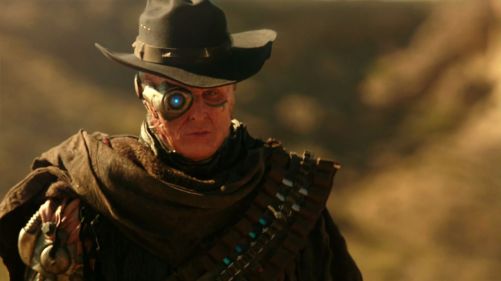
In “A Town Called Mercy”, we basically have two antagonists for the price of one. The main conflict of the episode is kicked off by an alien cyborg hunting down a team of scientists from his home-world, killing them all as revenge for the way they wronged him. His manhunt eventually leads him to the town of Mercy where Dr. Kahler-Jex lives: a mild-mannered genius and well-respected member of his community, who has done all of his neighbors a great service ever since he arrived at their borders. In truth, the alien physician has been hiding quite a nasty past as a war criminal and a fugitive from justice that’s catching up to him now.
Back on his home-world that been ravaged by a great war for many years, Jex and his colleagues recruited soldiers as test subjects for their experiments and turned them all into remote-controlled killing machines – stealing their humanity against their will. The people of Kahler won the war, but at a steep cost that Jex and his lot didn’t have to pay – until now. So the Gunslinger, Kahler-Tek, holds the old west town hostage and threatens to raze it to the ground unless he gets the man he’s hunting for. But despite delivering that terrifying ultimatum, it’s made pretty apparent that the Gunslinger doesn’t want to harm innocents on Earth. By this point, he’s accepted that he’s a monster and a walking weapon, and that there’s nothing left for him in life except for his revenge, but there’s still a shred of honor left in him. As for Jex, the Doctor cuts right through every excuse or defense he tries to make for himself. Jex claims he wants to start a new life where he can do good for humanity, but the Doctor insists that he’s simply trying to run and hide from his past – and the parallels Toby Whithouse draws between the two men are pretty blatant.
Whenever Jex is pressed about his past actions, he quickly turns cold, haughty and belligerent as he goes on the defense. But despite that, he does indeed feel true remorse for his crimes and the damage they caused during private moments: like a quietly contemplative scene where he tells the Doctor about the beliefs of his people and what he should expect to face in the afterlife after his inevitable demise. This episode refuses to give the audience a clean, open and shut answer about which one of our two antagonists we should really be siding with, since neither of these two men are innocent, and neither of them are portrayed as totally evil, irredeemable monsters. This is a messy dilemma, and in many ways, “A Town Called Mercy” feels like the spiritual successor to “Boom Town” from Series 1.
At the end of the day, Jex decides to defuse the danger the Gunslinger presents, by taking responsibility for his actions for the first time in a long time. He decides to take his own life by blowing up his ship: this way, the Gunslinger can be given all the closure that he needs, Jex can save the town of Mercy, and he can prevent anyone else in the cosmos from being harmed by his legacy. Kahler-Jex is given a similar yet fundamentally different end to Solomon’s final, fiery fate in the last episode, with a redemptive moment of self-sacrifice. And depending on how you interpret it, Jex’s decision can also be seen as one last example of him taking the coward’s way out: he gets to die on his own terms, and he still doesn’t have to face the Gunslinger in the end. This episode’s main theme of atonement extends to the Gunslinger as well: once Jex is gone and peace has been restored to the town of Mercy, Kahler-Tek decides to become their new marshal, to make up for killing Isaac and causing the townspeople so much trouble. He can repay his debt to the people of Mercy, and find a brand new purpose, protecting life – it’s an ending that fulfils Isaac’s dream for the town, and works out quite nicely for everyone.
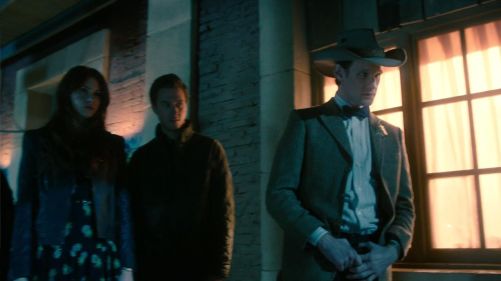
Like the previous episode, “Dinosaurs On A Spaceship“, “A Town Called Mercy” is directed by Saul Metzstein as part of the same production block. For Series 7, Steven Moffat wanted to take the show in a bold direction and really push the boundaries of what kind of stories it could tell, leading up to the 50th anniversary special. He requested that every episode look as professional and cinematic as possible, and Saul Metzstein certainly delivers on that front with his work on “A Town Called Mercy”, basking in the sunny, dusty desert scenery. Like “The Impossible Astronaut” last season, “A Town Called Mercy” features a lot of location shooting outside of Doctor Who’s usual haunts in the UK, giving us some absolutely gorgeous golden yellow vistas for the town of Mercy and its surrounding areas, as the sun rises and falls over the horizon.
This episode was primarily filmed in the deserts of Almeria, Spain (particularly in two old west theme parks, Oasys and Fort Bravo): a region of the world where film studios have built dozens and dozens of sets for western towns over the years. And the production crew’s decision to set up shop in Spain certainly helps to make “A Town Called Mercy” feel authentic in its attempts to replicate the style of an old school, Hollywood western. Murray Gold’s score once again undergoes a large, radical transformation in this episode, to match the genre of the week: the distinctive southern twang of the American Midwest is even thicker here in Murray’s music than it was in the Series 6 premiere. Tracks like “Make Peace“, “Welcome To Mercy“, “Out West“, “Gunslingers“, “The Salvation Of Kahler-Jex” and “Our Town’s Little Protector” are filled to the brim with acoustic guitars, steel guitars, harmonicas, and the soulful crooning of several vocalists, giving Murray’s score a hearty, rustic bluegrass flavor.
Following in the footsteps of “The God Complex” from last season, “A Town Called Mercy” is a pretty fantastic spotlight episode for Matt Smith’s Doctor that develops the core morality of his character well, and is one of the overall gems of Series 7, courtesy of Toby Whithouse.
Rating: 10/10.
Side-Notes:
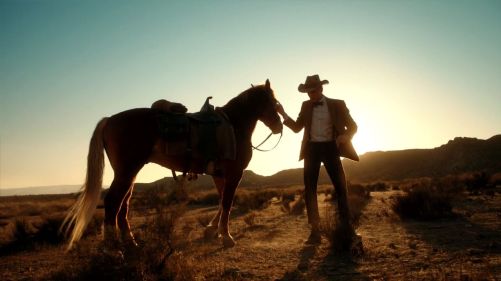
* “When I was a child, my favorite story was about a man who lived forever, but whose eyes were heavy with the weight of all he’d seen. A man who fell from the stars“.
* “Am I the last one?” “There’s one more: the Doctor”.
* “But that’s you. Why would he want to kill you? Unless he’s met you”.
* “They’re scared, that’s all. You can hardly blame them” “Them being scared scares me”.
* “No, he isn’t. I speak horse. He’s called Susan, and he wants you to respect his life choices” Heh, never change, Doctor Who. Also, I wonder if that particular name is meant to be a nod to Susan Foreman, the Doctor’s granddaughter.
* “So, we wait here till the Doctor comes to pick us up in your ship” “Yes, I know. I was there when we agreed on it” “Yeah, I said that more for my benefit than yours”.
* “But that wasn’t the plan. He’s not following the plan!” “Welcome to my world”.
* “You want justice, you deserve justice, but this isn’t the way. We can put him on trial-” “When he starts killing your people, you can use your justice!”
* “He’s lying. Every word, everything he says, it’s all lies. This man is a murderer” “I am a scientist!” “Sit down. SIT DOWN!!!”
* “Look, Jex may be a criminal and yeah, kind of creepy-” “And still in the room”.
* “Let him come back, Doctor!” “Or what? You won’t shoot me, Amy” “How do you know? Maybe I’ve changed. I mean, you’ve clearly been taking stupid lessons since I saw you last!”
* “Okay, everyone who isn’t an American, drop your gun!” Today I learned Amy Pond has terrible trigger discipline.
* “But they coming back, don’t you see? Every time I negotiate, I try to understand. Well, not today. No. Today, I honor the victims first. His, the Master’s, the Dalek’s, all the people who died because of my mercy!”
* “I promised Isaac I’d protect him” “Protecting him got Isaac dead. Tomorrow, it’s going to get us all dead” Oof, that grammar.
* “Is he really worth the risk?” “I don’t know. But you are”.
* “Frightened people. Give me a Dalek any day” After what happened to the Doctor in “Midnight” a few seasons back, I can’t blame him in the slightest for making that remark.
* “Oh, I know exactly what you are, and I see this reformation for what it really is. You committed an atrocity and chose this as your punishment. Don’t get me wrong, good choice. Civilized hours, lots of adulation, nice weather, but justice doesn’t work like that. You don’t get to decide when and how your debt is paid!”
* “When this is over, will you go back to Gabriah?” “How can I?! I’m a monster now!” “So am I”.
* “What’s going on?! Jex! What’s happening?!” “Thank you, Doctor. I have to face the souls of those I’ve wronged. Perhaps they will be kind”.
* “The next time you’re in Mercy, ask someone why they don’t have a marshal or sheriff or policeman there. We’ve got our own arrangement, they’ll say, then they’ll smile like they got a secret. Like they’ve got their own special angel watching out for them. Their very own angel who fell from the stars“.
Further Reading:
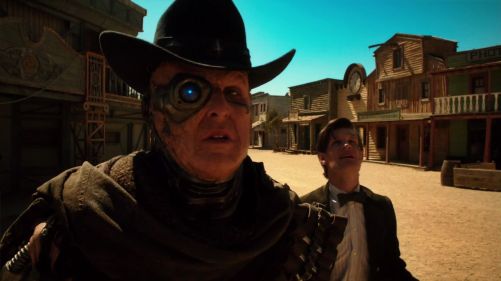

Pingback: Doctor Who: The God Complex (2011) Review | The Cool Kat's Reviews
Pingback: Doctor Who: Dinosaurs On A Spaceship (2012) Review | The Cool Kat's Reviews
Pingback: Doctor Who: The Power Of Three (2012) Review | The Cool Kat's Reviews
Pingback: Doctor Who: The Snowmen (2012) Review | The Cool Kat's Reviews
Pingback: Doctor Who: Cold War (2013) | The Cool Kat's Reviews
Pingback: Doctor Who: Hide (2013) Review | The Cool Kat's Reviews
Pingback: Doctor Who: The Crimson Horror (2013) Review | The Cool Kat's Reviews
Pingback: Doctor Who: The Name Of The Doctor (2013) Review | The Cool Kat's Reviews
Pingback: Doctor Who: School Reunion (2006) Review | The Cool Kat's Reviews
Pingback: Doctor Who: The Time Of The Doctor (2013) | The Cool Kat's Reviews
Pingback: Doctor Who: Under The Lake / Before The Flood (2015) Review | The Cool Kat's Reviews